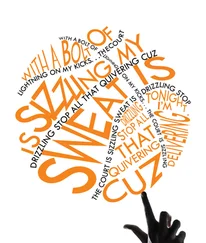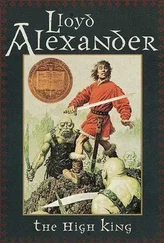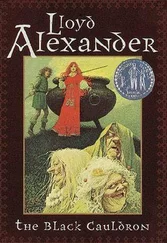He took another piece of cake and put it on a napkin in his lap. “There is one final thing to say on my wedding night.” He paused. His watery eyes took in everyone in the room. He shook his head as if he could not believe the cascading decline of his power, the shells exploding over his head, the destruction of his “lightning-war” army, was happening to him. “It’s over,” he finally said. “National Socialism is dead, never to be revived. Who would have the courage to lead such a movement but me?” His lips parted in a sardonic smile and he stared at Goebbels and Bormann in turn. They stood unflinching under his gaze.
“Anyone who wants to leave the bunker should do so,” he said.
“Never, my Führer,” Goebbels said, and saluted. Those assembled echoed this sentiment and saluted as well. I stood in the passageway with my arms by my sides.
Hitler held out his hands, as if pleading with the gathering. “You are released. Do not suffer with me. Everyone, except you, my loyal friends, has betrayed me. Even the German people have deserted me.” He clenched his fists and pounded them against his chest. “They haven’t the will to survive—they haven’t the backbone to stand up to our enemies. I have overestimated their worth from the beginning. They deserve to be crushed.” He sagged back on the couch like a deflating balloon.
Bormann shouted, “Yes, my Führer.”
Rage boiled through me. I wanted to strangle Hitler. He blamed the German people for his tyrannical failings. In one stroke, he discarded my father, my mother and my aunt and uncle who loyally supported him, even the innocent children who died in the streets in his name. No remorse flowed from the Führer. No apology sprang from his lips. Only blame. The devastating downfall was the result of the Wehrmacht. The soldiers were cowards who valued their lives more than their country; his generals and military officers were idiots who knew nothing of strategy and tactics. Who could blame the poor Führer when all of Germany was at fault?
“It will be a release for me to die,” he said. “And so I shall—here, with my wife by my side. She has chosen the same fate.”
Magda Goebbels burst into tears. Her husband rushed to her side until her blubbering subsided. Several of Hitler’s secretaries wiped their eyes as well.
As the gloom and depression of the suicidal confession spread over the room, several of the guests slipped away from the oppressive atmosphere. The wedding party was over. Hitler rose from the couch, taking care to wrap his cake in a napkin. He tucked it in his right pocket and walked past me, staring straight ahead as if in a trance, as I stood in the passageway.
Eva patted me on the shoulder. “Thank you for coming, Magda. I suppose I won’t be seeing much of you from now on.” She watched as the other guests disappeared in the passageway. “Leave as soon as you can. Get out of Berlin and head south toward Munich. The Americans will be there. They will be more forgiving than the Red Army.”
A secretary, Frau Junge, passed by and stepped into the adjoining room with Hitler.
“She’s a loyal one,” Eva said. “Junge will be here until the end.” She attempted to smile, but her mouth turned quickly into a frown. “Adolf is dictating his last will and testament. It won’t be long now.”
Eva kissed me on the cheek. “Good-bye, dear Magda.”
She walked to her room and left me with the valet and Dr. and Frau Goebbels, who sat on the couch in disbelief, stunned by their Führer’s decision to die in Berlin.
I, however, silently rejoiced.
* * *
The next morning, I sat on my bed and cried. No one came to my aid. I doubted that anyone cared, or if they did they were too tired and depressed to bother. I felt the effects of the bunker existence—the lack of fresh air, the walls closing around me, the same faces every day, a routine that never varied as the hours hung over me like those of a clock winding down. One of the SS men told me I shouldn’t worry about being outside; one couldn’t see the sun anyway because of the smoke. The Russians were firing artillery cannons point-blank as they advanced. Berlin was burning to the ground. Now shells struck above us relentlessly and the ground shuddered. The attack came faster and with more ferocity as the hours dragged on.
I pulled myself together and thought about how I could get south to Munich and Berchtesgaden. The journey seemed impossible; however, I would worry about it when the time came to evacuate—if I got out of the bunker alive.
Shortly after eleven that same morning, Cook rushed into my room, her face wild and flushed. “Mussolini is dead,” she said. “The Führer is distraught. His best friend is gone.” She sat on my cot for a time, her arms bouncing wildly at her sides as if she didn’t know what to do. “I’m not leaving him, Magda. Neither is Frau Junge. We will remain until the end.”
I grasped her hands. “You should leave with me. We can travel to Berchtesgaden. It will be safer there. We can stay with my aunt and uncle if we can’t get to the Berghof.”
She looked at me in amazement. “What about your father and your friends in Berlin?”
I shuddered. “I have no idea where my father is or if my friends are still alive. I can’t face the Russians—again.” The finality of losing my father crushed me. I, like everyone else in Germany, had lost so much. Cook leaned toward me and we both hugged. It was a simple gesture born of loss.
After a time, Cook said, “I must go. He’s not eating, but I still make his meals.” She hugged me. “Please say good-bye before you leave.”
I nodded, lay back on my cot and remained there for about twenty minutes until I could rest no longer. I got up and paced the room. I needed to see the sun, breathe the air again, before I was captured or killed. My chances of escaping the bunker seemed slim.
Cook had told me about an emergency exit on the west end leading to the bombed-out garden behind the New Chancellery that Speer had constructed. Several people, including Eva, had gone there to get a breath of air. I left my quarters and crossed through the canteen to the passageway leading to the lower bunker. I walked down the stairs. The guard gave me a quick glance and waved me through as if my presence didn’t matter. He, too, knew the end was near. The central passageway was long and led past the conference room and Hitler’s quarters. Beyond them, I saw a figure stooped in shadow near a door.
“Kill her,” I heard him say. “I don’t want her captured by the Russians any more than Eva and I want to be. The Italians have made a mockery of my friend—strung him up like a pig on a hook. I will not allow this to happen to her… .” He struck his fist against the wall.
He stopped, suddenly aware of my presence, and glared at me with his sunken eyes. The crisp, astute Hitler had transformed into a slouching cave dweller, a grotesque monster of the underworld. He held up his hand for me to stop, leaned toward the door and pulled it partially shut. “What are you doing here?” he asked.
“I was hoping to get some air,” I said.
“Only those who have permission can leave the bunker by this route.” He turned away from the door. “You might get killed.”
A man stuck his head out of the room and said, “It’s done. The poison was quick as lightning.”
“Leave me and take the puppies,” Hitler ordered. The man stepped back inside and a few moments later came out with a box. As he passed, I heard the muffled scratching and whining of the young dogs. He proceeded down the passageway toward the stairway leading up to the exit. Hitler shuffled inside. Soon muffled sobs filtered into the passageway.
I stole forward hoping to see whose death had elicited such a response from Hitler. The door was cracked. The light inside the room was harsh. Hitler knelt on the floor, his chest heaving over the black-and-tan creature that lay silently on the floor. Blondi had been poisoned.
Читать дальше












